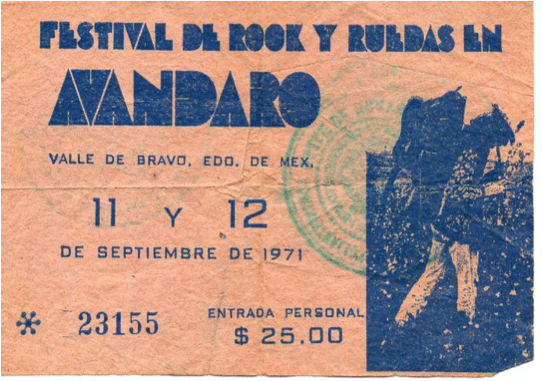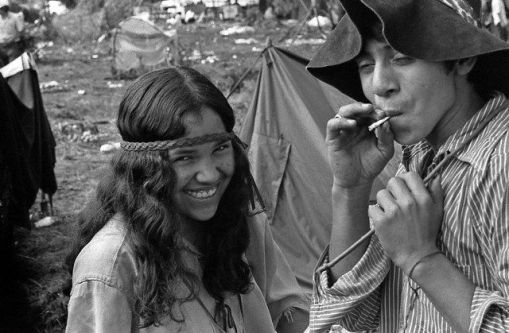
Interview and words by Angie Moon
Everybody knows Woodstock, that one festival in upstate New York that took place from 15-17 August 1969. It’s arguably the most famous and legendary music festival ever. Songs like “Woodstock” and “For Yasgur’s Farm” were written about that incredible, one-of-a-kind weekend. A Woodstock film was released in 1970. Pretty much any classic rock lover of any age has seen it. Forty years after “Three Days of Peace & Music”, Taking Woodstock came out.
If music festivals were a question on Family Feud, Woodstock would be #1. The survey might also say Isle of Wight, Monterey Pop Festival, or Glastonbury. Younger people might mention SXSW, Coachella, or Lollapalooza. Every generation has had their iconic music festivals, and certainly every country has too.

In this post, we’ll be talking to Victor Moreno, drummer of hard rock band Medusa, who worked at the famous Avándaro festival, inspiring him to make his own music.
At the age of 17, Victor was a roadie for El Ritual, considered Mexico’s best rock band and because he worked for them, he was made stage manager for the festival. Of that experience, he said it was “brutal, but satisfying.”

Festival Rock y Ruedas de Avándaro was Mexico’s answer to Woodstock, taking place on 11-12 September 1971 on the shores of Lake Avándaro, near Valle de Bravo. This video on Facebook explains it well
First, a bit of context on the festival. Mexico, at the time were under a PRI government. In the late 60’s, like in many other parts of the world, there were strong student/youth opposition movements and the government repressed them. These young activists wanted democracy, political freedom, respect for diversity, worker’s rights, and for the government to provide for the people – for example, quality education for all.
On 2 October 1968, there was the Tlatelolco Massacre, which occurred days before the Olympics were held in Mexico City. About 10,000 students peacefully gathered in the Plaza de las Tres Culturas to protest the government and give speeches. During the demonstration, the military showed up and shots were fired. Hundreds died and about 1,300 people were arrested.
A few months before Avándaro, there was the Corpus Christi Massacre, also known as El Halconazo (The Hawk Strike). Student demonstrators planned to march from El Casco de Santo Tomás to Plaza de la Constitución. Police blocked the way and there were tankettes. Then, Los Halcones, an American-trained black ops army group attacked the students. One hundred and twenty lives were lost.
Mexico’s hippie movement was called La Onda (The Wave). Followers of this movement were known as Jipitecas. Jipitecas were inspired by music festivals like Varadero ’70 in Cuba, Festival de Ancón in Colombia, Festival Buenos Aires Rock in Argentina, and Isle of Wight Festival in England, and so Avándaro was born.

Q&A with Victor Moreno
MOOF: How did the band get started?
VM: Medusa were a project that were started by me and my friend Javier Plascencia (vocalist and bass player), who I met at school in 1968. We were part of the student movement in Mexico that resulted in the Tlatelolco Massacre. This moved us and we started writing songs for Medusa when we started playing in 1972.
MOOF: What was the rock scene in Mexico like in the 70s?
VM: The scene was dominated by Anglo rock. Although in Mexico, Spanish language rock started in 1957, record labels made bands record covers without considering the importance of the original compositions that were made since then. With this scene, we get to the 70s, when bands started recording their original compositions, but in English. This is known as the Onda Chicana because the people known as Chicanos are American-born offspring of Mexican parents.
MOOF: How mainstream was rock music in Mexico?
VM: Rock music enjoyed a lot of popularity then and when Mexican bands’ original English compositions started to play on the radio, they became famous and then infrastructure like TV shows, print media, tours, cinema, etc. started to develop in a very short period of time.
MOOF: For those outside of Mexico, how would you describe Avándaro?
VM: Avándaro Festival was a unique social and cultural phenomenon in Latin American history that resulted in a lot more than I can describe in words. In my opinion, it happened because young Mexicans were looking for a break from government repression against students from 1968-1971. No one, neither the promoters, nor the musicians, nor the people, and much less, the government could have imagined the reach it had. They expected 10,000 people but in reality, 300,000 people attended.
MOOF: How was it like Woodstock and how was it different to Woodstock?
VM: The similarities with Woodstock were the peaceful coexistence between the people; rainy days; the opportunity that groups had to present their original proposals; drug taking; the fact that the moment came that no one could control so many people who arrived, and from there they allowed free access; the feeling of liberation between the people working the festival.
The opening act for the festival were a theatre group from UNAM (National Autonomous University of Mexico) with a production of The Who’s rock opera “Tommy”. It was a free interpretation and from what I can tell, it was the first time it was ever presented in that way.
The difference between the two festivals were the motivations for starting them. Originally, they tried to do a celebration for the anniversary of Mexican Independence Day with a car race, but this never happened. The sociopolitical reality in Mexico was different to the United States, and therefore, the effects were also different.
MOOF: Who were your biggest influences both Mexican and International?
VM: When we finally started to play, my favourite influences were English bands like The Rolling Stones, The Yardbirds, Black Sabbath, The Who, Uriah Heep, Cream, Led Zeppelin, and Deep Purple, among others. Of Mexican groups, my influences were Los Dug Dug’s, El Hangar Ambulante, Náhuatl, and El Ritual.
MOOF: Did you get to see any of your idols live?
VM: At that time, I only saw Mexican bands. There weren’t any international bands playing concerts in Mexico.
MOOF: How was your music received in Mexico?
VM: In the beginning, our music was received well. People would follow what we did because we were on the radio. Our albums were shared the same as any other group. By 1973, we were already singing in Spanish. Medusa never made music in English, nor played covers, only original music.
MOOF: Did your music get heard in other Latin American countries?
VM: Actually yes, thanks to the Internet.
MOOF: Do you think that not releasing music in English prevented you from achieving fame in the US and elsewhere?
VM: I’m not sure about that. What stopped Medusa and other groups from achieving fame and international exposure was government prohibition of our music. On their orders, we were erased from radio, TV, print media, and everything else. They considered rock music something that incited rebellion and they closed the doors on us. Had we made music in English, they would have censored us anyway. With this action, the Mexican government destroyed a developing industry, yet they couldn’t silence it completely.
MOOF: What was your proudest moment of your career?
VM: Perhaps the present because younger generations are rediscovering what we made over 40 years ago and we have a presence on the web thanks to fans and researchers. Our recordings are in demand and we find many people are looking us up to learn more about our history.
MOOF: What were some of the most difficult moments for Medusa?
VM: When we had to go on hiatus, either because there were no adequate work conditions or because of personal situations not allowing us to work together.
MOOF: Any regrets or things you wish you could do differently?
VM: There are always things that you feel like you should have done differently, but they are part of the learning experience. Your reality is the product of this, therefore there is no point in thinking about what could have been if you had done something differently.
MOOF: Which of your songs would you call your most important ones that new fans should listen to?
VM: “Autodestrucción”, “Genes de Maldad”, “Caminando Rumbo al Cementerio”, “Centella”, “La Sombra de Nietzche”.
MOOF: What inspires your band’s songwriting?
VM: Many things: the state of the soul, the product of lived experiences, fantasy, awareness, but most of all, love. Love of life, people, nature, and the universe.
Medusa’s last concert was in June 2015. The band’s original lineup were lead guitarist Luis Antonio Urquiza Zanella, bassist and vocalist Javier Plascencia Amoróz, and drummer Víctor Moreno de León. In 1982, Jaime García Mares joined the band, playing guitar and synthesiser.
With thanks to Victor Moreno for his participation
You can follow Medusa on Facebook
Angie Moon is a classic rock blogger and the creator of The Diversity of Classic Rock, a blog that discusses the diverse sounds and people who shaped the genre and era. In her spare time she likes to collect vintage clothing, listen to vinyl, and take pictures of the places she travels to. Her Instagram is @angiemoonthemod
MOOF claims no credit for any images posted on this site unless otherwise noted. If there is an image appearing on this blog that belongs to you and you do not wish for it appear on this site, please E-mail with a link to said image and it will be promptly removed




Reblogged this on The Diversity of Classic Rock and commented:
An article I wrote for Moof Magazine. It was a lot of fun doing research on the Avándaro Festival and speaking with Victor Moreno.
LikeLike
Excellent interview with Mr. Moreno on this so important event in Mexico. I moved to Mexico city from Tijuana four moths after Avandaro as a Rocker, (I am 69) and got to live the aftermath effect of Avandaro festival, amazing period of my life. I met Mr. Moreno back than, great dude man! Congratulations on this story, well done
LikeLiked by 1 person
Angie,
Great to learn about the Rock y Ruedas de Avándaro festival and great interview. I didn’t know about the suppression of rock music by the Mexican government. This was very informative. Thanks for posting and well done on your original article!
LikeLiked by 1 person